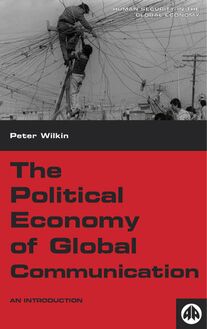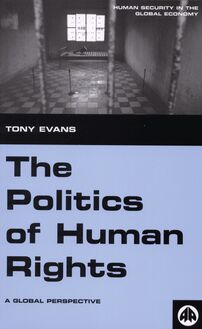The Political Economy of Global Communication , livre ebook
170
pages
English
Ebooks
2001
Obtenez un accès à la bibliothèque pour le consulter en ligne En savoir plus
Découvre YouScribe en t'inscrivant gratuitement
Découvre YouScribe en t'inscrivant gratuitement
170
pages
English
Ebooks
2001
Obtenez un accès à la bibliothèque pour le consulter en ligne En savoir plus
Publié par
Date de parution
20 septembre 2001
Nombre de lectures
0
EAN13
9781849640350
Langue
English
He reveals how human security is a concern with social relations that connect people in local, national and global networks of power, structured through capitalism and hierarchical inter-state systems.
Autonomy, as an aspect of human security, depends upon the ability of citizens to gain information about the processes that shape their lives. In this respect autonomy and communication are inherently linked and are prerequisites for the establishment of meaningful democratic systems.
Introduction. Fulfilling the Enlightenment? Attaining Human Security.
1. The triumph of democracy and freedom. Political change after the Cold War.
a) The privatisation of the State
b) The Legitimacy of Human Intervention under the guise of Humanitarian intervention
c) The Spread of a technical elite led political processes
2. Global capitalism and the end of history.
a) The enhanced mobility and accumulation of Capital
b) The Diminution of the Rights of Working People
c) Free trade, Protectionism and Uneven development in world Order
3. Global order and cultural freedom.
a) The Rise of a Global Communications Industry
b) Capitalism, Neo-Liberalism and the Privatisation of Culture
c) Culture Ideology and Political Power.
Conclusion: Perverting the Enlightenment? Resistance and change in world order.
Publié par
Date de parution
20 septembre 2001
Nombre de lectures
0
EAN13
9781849640350
Langue
English
The Political Economy of
Global Communication
An Introduction
Peter Wilkin
PlutoP Press
LONDON • STERLING, VIRGINIAFirst published 2001 by Pluto Press
345 Archway Road, London N6 5AA
and 22883 Quicksilver Drive, Sterling, VA 20166-2012, USA
www.plutobooks.com
Copyright © Peter Wilkin 2001
The right of Peter Wilkin to be identified as the author of this work has
been asserted by him in accordance with the Copyright, Designs and
Patents Act 1988.
British Library Cataloguing in Publication Data
A catalogue record for this book is available from the British Library.
Library of Congress Cataloging-in-Publication Data
Wilkin, Peter.
The political economy of global communication : an introduction /
Peter Wilkin.
p. cm. – (Human security in the global economy)
ISBN 0-7453-1406-6
1. Telecommunication–Mergers. 2. Mass media–Mergers. 3.
Consolidation and merger of corporations. 4. Globalization–Economic
aspects. 5. Telecommunication–Political aspects. I. Title. II.
Series.
HE7631 .W535 2001
384’.041–dc21
2001002157
ISBN 0 7453 1406 6 hardback
ISBN 0 1401 5 paperback
10 09 08 07 060504030201 9 8 7 654321
Designed and produced for Pluto Press by
Chase Publishing Services, Fortescue, Sidmouth, EX10 9QG
Typeset from disk by Gawcott Typesetting Services
Printed in the European Union by TJ International, Padstow, EnglandContents
List of Figures and Tables vii
Acknowledgements ix
Introduction 1
1. Understanding Human Security 4
Human security and international relations 4
Defining human security 5
Security and the study of international relations 7
Global communication and human security 16and world order 18
Communication, human security and the public sphere 21
2. Towards a Global Communications Industry 24
Global communication – a historical overview 24
States and mass communications 27
The political economy of global communication –
understanding the transformation of media markets 29
Technology, ideology and social power in the political
economy of communication 31
Neoliberal political economy 39
The impact of neoliberal political economy –
globalising tendencies 40
A qualitative change in global communication? 46
Global communications? The changing structure of the
communications industries 47
Global communication and the changing structure of
ownership and control – from synergy to oligopoly 48
Globalisation and the information society –
an introduction 51
Conclusions: problems for human security 52
3. Human Security and Global Communication –
Into the Twenty-First Century 53
Knowledge, power and rationality 53
Communication needs and human security 59
Developments in the political economy of education 65
Global communication, information and human security 71
Neoliberal political economy – idealised brutality 72vi The Political Economy of Global Communication
Conclusions: obstacles to human security –
the limits of neoliberal analysis 80
4. Public Sphere, Private Power –
The Limits to Autonomy and Human Security 83
Developments in the public sphere? 83
A neoliberal Utopia? The information society considered 86
Conclusions: The Good Society? 94
5. Building the Perfect Beast:
The Information Society Revealed 96
Democracy against capitalism? The neutered state 108
Human security, autonomy and the information society 113
Conclusion: human security and the public sphere
in an age of information 123
6. Global Communication, Human Security
and the Challenge to the Public Sphere 125
Globalisation and human security 125from above 126below 131
The global public sphere and human security 133
Notes 136
Bibliography 145
Index 160List of Figures and Tables
Figures
2.1A model of global political economy 29
2.2 The growing gap between rich and poor countries 43
Tables
2.1Top ten global telecommunications corporations 26
3.1Comparative annual global expenditure in US$ billions 68
3.2 Global distribution of the world’s ultra-rich, 1997 73To Pa WilkinAcknowledgements
Thanks to the following: All at Pluto Press for the opportunity to
write this, and to my colleagues at Lancaster University (especially
Andy Stafford, Gordon Hands, Bob McKinley and Mick Dillon),
Caroline Thomas, John Glenn, Lloyd Pettiford, Martin Elvins,
Cathal Smyth, John Boyle, Nektarios Koulieris, Louise Saxelby, Jan
Selby, and Anelka. At the eleventh hour, thanks also to Katriona
Gillespie, and finally, to Laura Shaw and my family.Introduction
As an academic discipline, international relations has been
primarily concerned with issues of state security in an insecure world. To
this end the primary focus of research, particularly in the
AngloAmerican world, has been upon the nature of inter-state relations.
This, in turn, has led to a focus upon the ways in which the
historical tensions that have existed between competing states can be
controlled through either a balance-of-power mechanism (realism)
or overcome through cooperative arrangements (liberalism)
(Kegley, 1995, Chapter 1; Baldwin, 1993, Introduction and Chapter
1; Nicholson, 1998). The period of the Cold War and nuclear
standoff saw this account of international relations become
institutionalised and frozen in the structure of the international
system itself, which threatened potentially to resolve these issues of
insecurity once and for all in disastrous fashion. The apparent end
of the Cold War has, according to many commentators, seen a shift
in the focus of concern of both the discipline of international
relations and in the actions of the major institutions and actors in the
global political arena. In this book I intend to address many of the
assumptions that have underpinned these recent developments in
the discipline of international relations in order to draw out their
implications for human security and global communication. As I
will show, the conventional framework for understanding
interstate security in international relations has invariably privileged the
legitimacy and primacy of state institutions at the expense of
asking fundamental questions about the causes of social conflict
and cooperation. As is often acknowledged in the literature, the
dominant model of world order in international relations often
follows a Hobbesian account of state–society relations in which the
very possibility of society rests upon the necessity of establishing
the overriding power of state institutions. The logic of this reads as
follows: without the state there can be no social order, as our
rational and self-interested egoism would mean that we endlessly
seek to acquire power to render ourselves secure. As power is a finite
factor, our security can only be gained at the expense of everyone
else in a vicious zero-sum game. What makes me more secure
necessarily makes you less so. The ‘timeless essence’ of human nature
compels us to acknowledge this fact and to build state institutions
1accordingly. During the Cold War the idea of ‘for reason of state’
12 The Political Economy of Global Communication
became a theme that helped to shape and legitimise the policies of
both superpowers as internal opposition was often suppressed, with
varying degrees of violence, by the governing institutions of either
the United States or the Soviet Union directly, or through
subordinate governments or National Security States (Franck and
2Weisband, 1971; Chomsky, 1982; Waltz, 1999: 9 ). As a dominant
ideology of international relations (as both academic discipline and
nation-state practices), these assumptions helped serve to fuel the
very crises of human insecurity that concern this book. The
complexities of global social relations are simplified in this
orthodox view of politics at the expense of the issues of
social power that are central to social, political and economic
relations. My main concern here is with the role of the
communications industries in the global political economy and the
obstacles and potentials that they present to human security. Thus
in order to address this question the book considers a number of
themes, introduced below.
Chapter 1 sets out to examine and help define the concept of
human security in the context of debates on international relations
and the important part that global communication plays in this
debate. Chapter 2 examines the meaning of global communication
in an era dominated by neoliberal approaches to political economy
and raises questions about the power of the communications
industries themselves over politics, the economy and culture; the
implications for human security of an increasingly privately
controlled means of communication, and the impact of New
Information Technology (NIT) on politics, economy and culture.
Chapter 3 sets out the idea of human security in some detail, both
as reflected in the work of the UN Human Development Reports and
also by way of criticism of that work; from there I examine the
relationship between communication needs and human security in an
era when the means of are both potentially more
diverse and pluralised than ever before. At the same time, we are
faced with a social reality in which power over the future direction
of the means of communication is increasingly placed in the hands
of a comparatively small number of private actors and national
governments. Human autonomy and a free society, I argue, are
central features of human security. They are the bases for our ability
to make rational choices about social, political and economic life.
To this end education and literacy are crucial to human security as
tools of intellectual self-defence and development. This chapter
looks at the political economy of education as a facilitator of the
communication that is a necessary feature of our ability to take
advantage of the resources available to us.
Chapter 4 elaborates upon the important role that
communication plays in any democratic political process and considers theIntroduction 3
contrasting methods of organising the means of communication to
facilitate the democratic goals of the participation of an informed
and critical citizenry.

